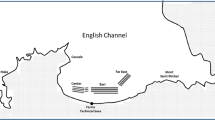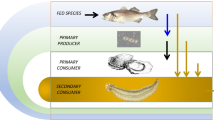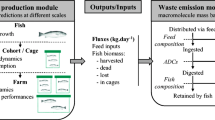Abstract
Purpose
In Algeria, the Ministry of Fisheries and Halieutic Resources has designed a strategic plan for the development of marine aquaculture for the years 2015–2025, which aims at expanding the annual production of Mediterranean mussel from less than 150 metric tonnes year−1 in 2013 to 7600 metric tonnes year−1 in 2025. We used Life Cycle Assessment (LCA) for evaluating the environmental impact of suspended mussel culture in Algeria and suggest management practices which could reduce it.
Methods
In order to estimate the current and perspective impact of this industry, we (1) applied LCA to one of the few farms currently operating in Algeria and (2) investigated two management scenarios for the farms to be established in the future in the same coastal area. The first scenario (Comp_S) represents the continuity with the current situation, in which each farm is competing with the other ones and is therefore managing the production cycle independently. In the second scenario (Coop_S), mussel farms are grouped in an aquaculture management area and shared the same facilities for post-processing harvested mussels before sending them to the market. The midpoint-based CML-IA method baseline 2000 V 3.01 was employed using SimaPro software. Furthermore, we carried out a Monte Carlo simulation, in order to assess the uncertainty in the results.
Results and discussion
The analysis focused on impact categories related to acidification and global warming potential. We took into account the energy consumptions (electricity and vessel fuel), the rearing infrastructure, including longlines, and a building for stabling, grading, and packing the mussel. Electricity contributes with 38.1 and 31.8 % respectively to global warming potential (GWP) and acidification, while fuel consumption contributes with 19.5 % to GWP and 31.8 % to acidification. Results of this work are compared with other LCA studies recently carried out in France (Aubin and Fontaine 2014) and in Spain (Iribarren et al. 2010c).
Conclusions
The LCA results show that important reductions in environmental impacts could be attained if the mussel farming activity would be operated according to the cooperative scenario here proposed. In this case, the environmental benefits will be a reduction of 3150 MJ and 156 kg CO2 eq per metric tonne of mussel produced, compared with the alternative scenario. The results of this study suggest that LCA should be applied to the seafood production sector in Algeria, in order to identify best management practices.




Similar content being viewed by others
References
Akbi A, Yassaa N, Boudjema R, Aliouat B (2016) A new method for cost of renewable energy production in Algeria: integrate all benefits drawn from fossil fuel savings. Renew Sust Energ Rev 56:1150–1157
Aubin J (2013) Life cycle assessment as applied to environmental choices regarding farmed or wild-caught fish. CAB Rev 8:11. doi:10.1079/PAVSNNR20138011
Aubin J, Fontaine C, (2014) Environmental impacts of producing bouchot mussels in Mont-Saint-Michel Bay (France) using LCA with emphasis on potential climate change and eutrophication. 9th International Conference LCA of Food. San Francisco, USA
Aubin J, Papatryphon E, Van Der Werf HMG, Chatzifotis S (2009) Assessment of the environmental impact of carnivorous finfish production systems using life cycle assessment. J Clean Prod 17:354–361
Avadí A, Fréon P (2013) Life cycle assessment of fisheries: a review for fisheries scientists and managers. Fish Res 143:21–38
Avadí A, Fréon P (2015) A set of sustainability performance indicators for seafood: direct human consumption products from Peruvian anchoveta fisheries and freshwater aquaculture. Ecol Indic 48:518–532
Ayer NW, Tyedmers PH, Pelletier NL, Sonesson U, Scholz A (2007) Co-product allocation in life cycle assessments of seafood production systems: review of problems and strategies. Int J Life Cycle Assess 12(7):480–487
Bélaid F, Abderrahmani F (2013) Electricity consumption and economic growth in Algeria: a multivariate causality analysis in the presence of structural change. Energ Policy 55:286–295
Brigolin D, Davydov A, Pastres R, Petrenko I (2008) Optimization of shellfish production carrying capacity at a farm scale. Appl Math Comput 204:532–540
Brigolin D, Dal Maschio G, Rampazzo F, Giani M, Pastres R (2009) An individual-based population dynamic model for estimating biomass yield and nutrient fluxes through an off-shore mussel (M. galloprovincialis) farm. Estuar Coast Shelf S 82:365–376
Cao L, Diana JS, Keoleian GA, Lai Q (2011) Life cycle assessment of Chinese shrimp farming systems targeted for export and domestic sales. Environ Sci Technol 45:6531–6538
Cao L, Diana JS, Keoleian GA (2013) Role of life cycle assessment in sustainable aquaculture. Rev Aquac 4:1–11
Ewoukem TE, Aubin J, Mikolasek O, Corson MS, Tomedi Eyango M, Tchoumboue J, van der Werf HMG, Ombredane D (2012) Environmental impacts of farms integrating aquaculture and agriculture in Cameroon. J Clean Prod 28:208–214
FAO (2011) Code of conduct for responsible fisheries. FAO, Rome 91 pp
FAO (2014) The state of world fisheries and aquaculture 2014. FAO, Rome 223 pp
FAO/World Bank (2015) Aquaculture zoning, site selection and area management under the ecosystem approach to aquaculture. Policy Brief, 4 p
Ferreira JG, Hawkins AJS, Bricker SB (2007) Management of productivity, environmental effects and profitability of shellfish aquaculture—the farm aquaculture resource management (FARM) model. Aquaculture 264:160–174
Filgueira R, Byron CJ, Comeau LA, Costa-Pierce B, Cranford PJ, Ferreira JG, Grant J, Guyondet T, Jansen HM, Landry T, McKindsey CW, Petersen JK, Reid GK, Robinson SMC, Smaal A, Sonier R, Strand Ø, Strohmeier T (2015) An integrated ecosystem approach for assessing the potential role of cultivated bivalve shells as part of the carbon trading system. Mar Ecol-Prog Ser 518:281–287
Frischknecht R, Jungbluth N, Althaus H, Doka G, Dones R, Hirschier R, Hellweg S, Humbert S, Margni M, Nemecek T, Spielmann M (2003) Implementation of life cycle impact assessment methods. Ecoinvent Report 3, Duebendorf, Switzerland: Swiss Centre for LCI
Fullana-i-Palmer P, Puig R, Bala A, Baquero G, Riba J, Raugei M (2011) From life cycle assessment to life cycle management. A case study on industrial waste management policy making. J Ind Ecol 15:458–475
Garrido-Maestu A, Lozano-Leon A, Rodríguez-Souto RR, Vieites-Maneiro R, María-Jose Chapela M-J, Cabado AG (2016) Presence of pathogenic Vibrio species in fresh mussels harvested in the southern Rias of Galicia (NW Spain). Food Control 59:759–765
GFCM (2013) Resolution GFCM/36/2012/1 on guidelines on allocated zones for aquaculture (AZA). Committee on Aquaculture (CAQ), Eighth Session, Paris, France
Guermoud N, Ouadjnia F, Abdelmalek F, Taleb F, Addou A (2009) Municipal solid waste in Mostaganem city (Western Algeria). Waste Manag 29:896–902
Guinée JB, Gorrée M, Heijungs R, Huppes G, Kleijn R, de Koning A, van Oers L, Wegener Sleeswijk A, Suh S, Udo de Haes HA, de Bruijn H, van Duin R, Huijbregts MAJ (2002) Handbook on life cycle assessment. An operational guide to the ISO standards. Kluwer Academic Publishers, Dordrecht 692 pp
Heijungs R, Lenzen M (2014) Error propagation methods for LCA—a comparison. Int J Life Cycle Assess 19:1445–1461
Henriksson PJG, Guinée JB, Kleijn R, Snoo GR (2012) Life cycle assessment of aquaculture systems—a review of methodologies. Int J Life Cycle Assess 17:304–313
Henriksson PJG, Heijungs R, Dao HM, Phan LT, de Snoo GR, Guinée JB (2015) Product carbon footprints and their uncertainties in comparative decision contexts. PLoS One 10(3):e0121221. doi:10.1371/journal.pone.0121221
Himri Y, Malik AS, Arif S, Stambouli AB, Himri S, Draoui B (2009) Review and use of the Algerian renewable energy for sustainable development. Renew Sust Energ Rev 13:1584–1159
Iribarren D (2010) Life cycle assessment of mussel and turbot aquaculture—application and insights. University of Santiago de Compostela
Iribarren D, Moreira MT, Feijoo G (2010a) Life cycle assessment of fresh and canned mussel processing and consumption in Galicia (NW Spain). Resour Conserv Recy 55:106–117
Iribarren D, Moreira MT, Feijoo G (2010b) Implementing by product management into the life cycle assessment of the mussel sector. Resour Conserv Recy 54:1219–1230
Iribarren D, Moreira MT, Feijoo G (2010c) Revisiting the life cycle assessment of mussels from a sectorial perspective. J Clean Prod 18:101–111
ISO 14040 (2006) Environmental management—life cycle assessment—principles and framework. EN ISO 14040
Jerbi MA, Aubin J, Garnaouic K, Achoura L, Kacem A (2012) Life cycle assessment (LCA) of two rearing techniques of sea bass (Dicentrarchus labrax). Aquac Eng 46:1–9
Lin J, Li C, Zhang S (2016) Hydrodynamic effect of a large offshore mussel suspended aquaculture farm. Aquaculture 451:147–155
Lindahl O, Hart R, Hernroth B, Kollberg S, Loo L-O, Olrog L, Rehnstam-Holm A-S, Svensson J, Svensson S, Syversen U (2005) Improving marine water quality by mussel farming: a profitable solution for Swedish society. Ambio 34:131–138
Lloyd SM, Ries R (2007) Characterizing, propagating, and analyzing uncertainty in life-cycle assessment: a survey of quantitative approaches. J Ind Ecol 11:161–179
Lozano S, Iribarren D, Moreira MT, Feijoo G (2009) The link between operational efficiency and environmental impacts a joint application of life cycle assessment and data envelopment analysis. Sci Total Environ 407:1744–1754
Lozano S, Iribarren D, Moreira MT, Feijoo G (2010) Environmental impact efficiency in mussel cultivation. Resour Conserv Recy 54:1269–1277
MAP (1997) Arrêté du 29 juillet 1997 fixant les règles sanitaires régissant la production et la mise sur le marché de mollusques bivalves vivants
Ministry of Energy (2016) National energy balance 2015. Algerian Ministry of Energy Edition 2016, Algiers. http://www.energy.gov.dz/francais/uploads/2016/Bilans_et_statistiques_du_secteur/Bilan_Energetique_National/Bilan_Energitique_National_2015_last.pdf. Accessed 20 December 2016
MPRH (2008) Schéma Directeur de développement des activités de la pêche et de l’aquaculture, Horizon 2025. Ministère de la Pêche et des Ressources Halieutiques, Alger 151 p
Parker R (2012) Review of life cycle assessment research on products derived from fisheries and aquaculture: a report for seafish as part of the collective action to address greenhouse gas emissions in seafood. Sea Fish Industry Authority, 22 pp
Pelletier N, Tyedmers P (2007) Feeding farmed salmon: is organic better? Aquaculture 272:399–416
Pelletier NL, Ayer NW, Tyedmers PH, Kruse SA, Flysjo A, Robillard G, Ziegler F, Scholz AJ, Sonesson U (2007) Impact categories for life cycle assessment research of seafood production systems: review and prospectus. Int J Life Cycle Assess 12:414–421
PRé (2014) SimaPro 8. Software. Available at: http://www.pre.nl
Rampazzo F, Berto D, Giani M, Brigolin D, Covelli S, Cacciatore F, Boscolo R, Bellucci LG, Pastres R (2013) Impact of mussel farm biodeposition on sediment biogeochemistry in the north-west Adriatic Sea. Estuar Coast Shelf S 129:49–58
Rodríguez GR, Villasante S, do Carme García-Negro M (2011) Are red tides affecting economically the commercialization of the Galician (NW Spain) mussel farming? Mar Policy 35:252–257
Rosland R, Bacher C, Strand Ø, Aure J, Strohmeier T (2011) Modelling growth variability in longline mussel farms as a function of stocking density and farm design. J Sea Res 66:318–330
Samuel-Fitwi B, Wuertz S, Schroeder JP, Carsten S (2012) Sustainability assessment tools to support aquaculture development. J Clean Prod 32:183–192
Sanchez-Jerez P, Karakassis I, Massa F, Fezzardi D, Aguilar-Manjarrez J, Soto D, Chapela R, Avila P, Macias JC, Tomassetti P, Marino G, Borg JA, Franicevic V, Yucel-Gier G, Fleming IA, Biao X, Nhhala H, Hamza H, Forcada A, Dempster T (2016) Aquaculture’s struggle for space: the need for coastal spatial planning and the potential benefits of allocated zones for aquaculture (AZAs) to avoid conflict and promote sustainability. Int Res-Aquaculture Environment Interactions 8:41–54
Stambouli AB (2011) Promotion of renewable energies in Algeria: strategies and perspectives. Renew Sust Energ Rev 15:1169–1181
Stambouli AB, Khiat Z, Flazi S, Kitamura Y (2012) A review on the renewable energy development in Algeria: current perspective, energy scenario and sustainability issues. Renew Sust Energ Rev 16:4445–4460
Vázquez-Rowe I, Iribarren D, Moreira MT, Feijoo G (2010) Combined application of life cycle assessment and data envelopment analysis as a methodological approach for the assessment of fisheries. Int J Life Cycle Assess 15:272–283
Vázquez-Rowe I, Villanueva-Rey P, Moreira MT, Feijoo G (2016) Opportunities and challenges of implementing life cycle assessment in seafood certification: a case study for Spain. Int J Life Cycle Assess 21:451–464
Weidema BP, Wesnæs MS (1996) Data quality management for life cycle inventories—an example of using data quality indicators. J Clean Prod 4:167–174
Wernet G, Bauer C, Steubing B, Reinhard J, Moreno-Ruiz E, Weidema B (2016) The ecoinvent database version 3 (part I): overview and methodology. Int J Life Cycle Ass 21:1218–1230
Yacout DMM, Soliman NF, Yacout MM (2016) Comparative life cycle assessment (LCA) of tilapia in two production systems: semi-intensive and intensive. Int J Life Cycle Assess 21:806–819
Acknowledgements
Part of this work has been supported by EU Project No. 282977 “Marine Ecosystem Dynamics and Indicators for North Africa” (MEDINA) and the research fund for doctoral program supported by the Algerian Ministry of High Education and Scientific Research (Grant No. 487/PNE/ENS/Italie/2015-2016). We would like to thank Boualem Khodja for providing necessary data for the mussel farming systems.
Author information
Authors and Affiliations
Corresponding author
Additional information
Responsible editor: Ian Vázquez-Rowe
Rights and permissions
About this article
Cite this article
Lourguioui, H., Brigolin, D., Boulahdid, M. et al. A perspective for reducing environmental impacts of mussel culture in Algeria. Int J Life Cycle Assess 22, 1266–1277 (2017). https://doi.org/10.1007/s11367-017-1261-7
Received:
Accepted:
Published:
Issue Date:
DOI: https://doi.org/10.1007/s11367-017-1261-7




